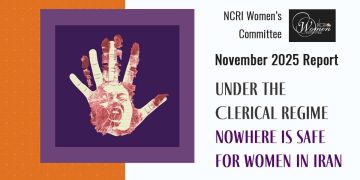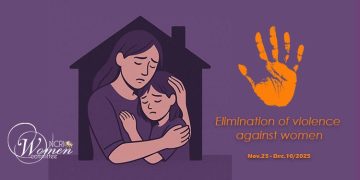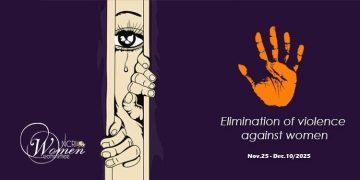A Special Report by the NCRI Women’s Committee on the International Day to Eliminate Violence Against Women and Girls
Femicide: Unpunished Crimes in Mullahs’ Iran
Murder and violence against women in every country is a shameful reality of the modern world, reminding us how far we are from human values. But in Iran, the situation is different under the rule of the clerics. Since coming to power, this government has humiliated and oppressed women with slogans like “either the veil or a beating on the head,” institutionalizing unjust and misogynistic laws, and promoting them both openly and in practice.
The evidence shows that state-sponsored crimes and violence against Iranian women outnumber family-related crimes by a significant margin. Iran is the world’s largest executor of women, with most female death row inmates having been victims of child marriage and domestic violence and condemned in unfair, biased trials.
The widespread assault and torture in prisons, shooting women protesters with pellets in the eyes, abuse in prisons and even in public, the daily brutality of the oppressive forces enforcing compulsory hijab in workplaces, schools, social settings, and online spaces, and thousands of other instances demonstrate that without this regime, the safety of Iranian women would look completely different.
The Increasing Statistics of Female Murders in Iran
Under the rule of Iran’s misogynistic regime, violence against women and their murders have increased each year, reaching extensive proportions.
Without reliable official statistics, current numbers and reports are only derived from limited news published in regime and local media. Many cases, due to the misogynistic nature of the regime and its lack of transparency, are never publicized or recorded anywhere. Yet this incomplete data is just the tip of the iceberg.
The regime newspaper Shargh revealed on June 25, 2023, that around 10% of the world’s honor killings take place in Iran. Citing official statistics, this report indicated that at least 165 women were killed in two years from June 2021 to the end of June 2023.
Meanwhile, the Women’s Committee of the National Council of Resistance of Iran recorded at least 105 honor killings and femicides, each with names and dates, during 2023.
On October 7, 2023, the regime newspaper Etemad reported that femicide in Iran, which was one murder every four days in over two years, has escalated in 2023 to one murder every other day. According to this report, in the spring of 2022, at least 22 women and girls were killed, in the spring of 2023, at least 28 women and girls, and in the spring of 2024, at least 35 women and girls were murdered in various cities across Iran.
According to a report by the regime’s Etemad newspaper on October 22, 2024, at least 78 women and girls were killed by male family members in the summer of 2024. Thus, the rate of murders of women in Iran rose from 35 in the spring to 43 in the summer.
The Women’s Committee of the National Council of Resistance of Iran, compiling all available reports, has documented the murders of 153 women from January to November 20, 2024. Some academic articles and theses estimate that between 375 and 450 femicides occur in Iran each year. (The state-run news agency ISNA – December 7, 2019)

Women of All Ages and Cities in Iran at Risk
Iranian women, be they children, young women, or elderly, lack safety both on the streets and in their own homes. If they survive the brutality of the repressive forces on the streets, they may fall victim at home due to a suspicion of dishonor, a disagreement with a husband, father, or brother, refusal of forced marriage, a desire for divorce, refusal to endure sexual assault, or even simply pursuing their legal rights and education.
In many instances, these crimes are committed in front of children or other family members, intensifying their destructive effects, and fueling the cycle of violence. Among the victims are pregnant women and mothers killed alongside their infants or children, tragedies that would disturb anyone’s conscience.
In Iran, the legal marriage age is 13, and a father or paternal grandfather can, with a judge’s approval, force girls into marriage even below this age. Reports of 7- and 10-year-old girls being forced to marry frequently appear in Iranian news.
Due to the legality of child marriage and forced marriages, and widespread poverty and deprivation, female murders are not confined to a particular region in Iran; they occur across the country under the regime’s misogynistic rule.
This year, according to the Etemad website, murders of women have been reported in numerous cities including Tehran, Ilam, Nikshahr, Arak, Andimeshk, Bampur, Bonab, Marand, Salmas, Chenaran, Fasa, Yasuj, Siahkal, Zanjan, Sib and Suran, Shiraz, Bandar Abbas, Beyza, Khorramabad, Sanandaj, Maneh, Abadan, Karaj, Qom, Miandoab, Iranshahr, Talesh, Qazvin, Sangar, Sabzevar, Mashhad, Behshahr, Tabriz, Dehloran, Bushehr, Jouybar, Semnan, Aleshtar, Ahvaz, Bardaskan, Khomein, and Falavarjan.

A Bill That Remains Unapproved
Whenever violence against women stirs public outrage in Iran, regime media bring up discussions of a bill supposedly aimed at preventing violence against women.
Article 29, Chapter 4 of this bill states that anyone who commits the intentional murder of a woman, if not subject to retribution and if the murder is premeditated, will receive a third-degree prison sentence (10-15 years) and otherwise a fourth-degree prison sentence (5-10 years).
Although the regime’s laws prescribe execution as the penalty for murder—and many women are executed each year for killing their husbands, often in self-defense—an inadequate and unfair bill titled “Preventing Harm to Women and Enhancing Their Security Against Abuse,” rather than a true anti-violence bill, has been stalled for 13 years. It continues to be passed back and forth between Parliament, the government, and the Assembly of Experts, with no approval in sight.
Where Are the Safe Shelters?
In Iran, even safe shelters are out of reach for women. There were only 27 safe shelters in the entire country (the state-run Rokna.net – June 7, 2022), some of which have also been closed due to lack of government support.
These shelters generally do not admit girls under 18. They also refuse to admit the male children of abused mothers, so if a mother seeks refuge, she must agree to give her young child away to the welfare organization.
Therefore, under the clerics’ misogynistic regime, the support for abused women is minimal, and even this limited assistance comes primarily from non-governmental organizations rather than the government.
Inverted Justice
The clerical dictatorship is infamous for its human rights violations and has held the record for per-capita executions for years. Yet, in the regime’s perverse justice, perpetrators of female murders are pardoned by judges. In extremely heinous cases, such as the beheadings of Romina Ashrafi and Mona Heydari, which made headlines at the time, the perpetrators who supposedly faced justice only served two years in prison.
A headline in the regime’s Etemad website on January 19, 2023, exposes this bitter contradiction: “Beheading one’s wife, 8 years in prison; removing the headscarf, 10 years in prison!”
According to clerical regime laws, the victim’s father, as the legal guardian of her blood rights or “vali-e-dam,” enjoys immunity from punishment. In cases of spousal or femicide, clerical laws frequently shield the killer from punishment on grounds of “honor” or suspicions of “illicit relations.”
According to Article 630 of the clerical penal code, “If a man catches his wife in the act of adultery with another man and knows she is willing, he may kill them both at that moment.”
Women as the Legal Property of Men Under Clerical Laws
In addition to these specific provisions, since regime laws grant all rights to men, any kind of abuse or oppression of women is effectively lawful.
Article 1105 of the clerical civil code regards family leadership as an “exclusive attribute” of men. Article 1108 emphasizes that if a woman refuses to fulfill her duties to her husband, she is not entitled to financial support. Article 1114 of the civil code dictates that a woman must reside in a house chosen by her husband.
Under this same law, a woman seeking divorce, with her testimony legally valued at half that of a man’s, must prove that living with her husband poses a mortal threat. In many cases, regime judges force women who have been beaten or stabbed to the brink of death to continue living with the perpetrator.
Legal Pursuit Impossible
In these circumstances, thousands of Iranian mothers who mourn their murdered loved ones must keep silent, confined to their grief in secrecy, unwilling to risk seeing the same crime committed by the head of their household. These living victims are sometimes even compelled to give their consent.
The misogynistic clerical regime practically encourages the perpetuation of such crimes. Systematic violence has captured the daily lives of Iranian women and girls, from the home and school to the street and society at large. As a result, we see an alarming rise in the murder of women across every corner of Iran.
This document records reported murders from January 1 to November 20, 2024, and highlights some tragic cases.
























